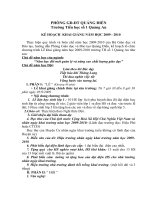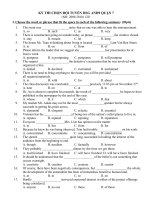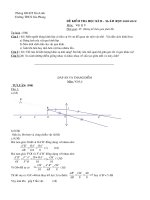10anh-nkl3-2019-20
Bạn đang xem bản rút gọn của tài liệu. Xem và tải ngay bản đầy đủ của tài liệu tại đây (872 KB, 7 trang )
<span class='text_page_counter'>(1)</span><div class='page_container' data-page=1>
1
<b>B. LEXICO-GRAMMAR </b>
<b>Part 1: Choose the best answer (A, B, C or D) to complete each sentence below. (10 points) </b>
1. Now that my summer vacation has just begun, I feel free as _____.
A. a bird
B. a cucumber
C. a pie
D. a pig
2. The whole building collapsed, but fortunately there were no _______.
A. wounded B. hurts
C. casualties
D. victims
3. I have got a ______ headache. I need to take a rest and some aspirin.
A. spitting
B. raving
C. splitting
D. burning
4. Martha has been hard _______ to it to organize a fancy dress party for the younger children.
A. forced
B. ordered
C. put
D. made
5. It was a daring robbery, which took place in ______ daylight.
A. broad
B. total
C. wide
D. absolute
6. Charlotte Bronte died of tuberculosis, ______.
A. as did all her sisters
B. and all her sisters did
C. and so were all sisters
D. either did all her sisters
7. Tom: “Do you think you'll pass the exam?” Jake: “I don’t know. ______”.
A. I am keeping my fingers crossed
B. My lips are sealed
C. That will be the day
D. A little bird told me
8. “Should we call Mike and get him to bring the CDs?”
- “It’s too late now. He __________ home already.”
A. was supposed to leave
B. will have left
C. could be leaving
D. had better leave
9. When he went to Egypt, he knew______ no Arabic, but within six months he had become
extremely fluent.
A. entirely
B. barely
C. virtually
D. scarcely
10. Children under 12 ____________ in the front seat of a car.
A. could not to travel
B. had better not to travel
C. ought to not travel
D. are not supposed to travel.
11. It’s essential that every student ______ the exam before attending the course.
<b>SỞ GD & ĐT HẢI DƯƠNG </b>
<b>TRƯỜNG THPT CHUYÊN </b>
<b>NGUYỄN TRÃI </b>
<b>ĐỀ THI NĂNG KHIẾU LẦN THỨ BA </b>
<b>MÔN: ANH </b>
<b>LỚP 10 </b>
<i><b>Ngày thi: 24/11/2019 </b></i>
<i><b>Thời gian làm bài: 180 phút </b></i>
</div>
<span class='text_page_counter'>(2)</span><div class='page_container' data-page=2>
2
A. pass
B. passes
C. would pass
D. passed
12. Ancient Egyptians mummified their dead through the use of chemicals, ________ancient Peruvians
did through natural processes.
A. because
B. whereas
C. even though
D. whether or not
13. I wrote to them a fortnight ago but ______ I haven’t had a reply.
A. as yet
B. these days
C. so long
D. just now
14. It’s not surprising that he became a writer because he always longed to see his name______.
A. in type
B. in print
C. in letters
D. in edition
15. The prospects of picking up any survivors are now ______.
A. thin
B. narrow
C. slim
D. restricted
16. ______ are a form of carbon has been known since the late eighteenth century.
A. Diamonds, which B. Because diamonds C. That diamonds D. Diamonds
17. Mark: “Do you think that smoking should be banned in public?” Veronica: “______”.
A. Yes, it’s an absurd idea
C. Of course not. You bet
B. Well, that’s very surprising
D. There’s no doubt about it.
18. Closure of many vocational schools took place ______ falling numbers of pupils.
A. in the context of B. with regard to
C. with a concern for D. in consideration of
19. He ______ his life to the skill of the surgeons.
A. owes
B. keeps
C. preserves
D. maintains
20. Marcus never writes the timetable down. He keeps it in his ______.
A. brain
B. head
C. mind
D. heart
<b>Part 2: Give the correct form of the word in CAPITAL to fill in the blank of each sentence. (5 points) </b>
1. She stood there completely ____, so I had no idea at all what she was thinking. EXPRESS
2. The university has _____the use of dictionaries during language examinations. AUTHOR
3. A number of religious groups, notably the Shakers, practiced ________living. COMMUNITY
4. Her ________ is unbearable, indeed. She wouldn’t even say boo to a goose. COWARD
5. He wanted Jill to give up her life of alcohol and __________. DESTROY
6. The EIU puts Mr. Trumps on the same level of risk as “the rising threat of Jihadi terrorism _________
the global economy”. STABLE
7. As a result of her _________, Ethel has strong sense of the difference between right and wrong.
BRING
8. Have our arguments convinced or do you need any more _________? ASSURE
9. Gift exchange is an expression of an existing social relationship or of the establishment of a new one that
differs from __________ market relationships. PERSON
10. Because of the lack of cooperation he decided to leave the project _________. FINISH
</div>
<span class='text_page_counter'>(3)</span><div class='page_container' data-page=3>
3
<b>Stress is often called the 21st century illness but it has always been with us if </b>
perhaps with different names. Those days we regard stress is a necessary evil of modern
living. Yet stress is not negative and without it we will not enjoy some of the highpoints in
life just as the anticipation before a date or the tension leading up to an important match.
All these situations produce stress but unless you can control it and not the other
way around you will feel stimulated, not worn out. Unlike these situations, what are
generally positive and easier to deal with, sitting in a train that is late, being stuck in a
traffic jam, working to a tight deadline are more harder to manage and control. Stress is
now recognized as a medical problem and as a significant factor in causing coronary heart
disease, high blooded pressure and a high cholesterol count. Patients are often
unwilling to admit to stress problems although they feel they are a form of social failure
and it is important that symptoms should be identified in order to avoid unnecessary
suffering. So why should we be looking out for as danger signals? Common signs
of stress are increased tiredness, irritability and the inability to solve with certain
situations.
LINE
0
1
2
3
4
5
6
7
8
9
10
11
12
13
<b>Part 4. Complete the sentences with the suitable particles or prepositions. (5 pts) </b>
1. I’d like to exchange this car __________ a new model but I can’t afford it.
2. Everybody put Mr. Spark's success ____ ____his extraordinary cleverness at persuading people to entrust
their money with him.
3. School children are gifted _________ coining nicknames for their teachers.
4. Van Gogh had an eye _________ detail and many of his works were mistaken for photographs.
5. When the child was healed, her parents were delirious _________ joy.
6. I wish my friends would call me first before they drop______.
7. He came ______ a large sum of money when his uncle died.
8. You look tired. Are you ______ the weather?
9. The book abounds ______ close-up images from space.
10. A brief outline of the course were handed ______ to the students at the first meeting.
<b>C. READING </b>
<b>Part 1. Read the text below and then decide which word best fits each blank. (5 points) </b>
Sleeping disorders like insomnia can prove to be a worrying question for many of us. Almost anyone
can easily conjure (1) _______ at least one sleepless night of (2) _______ and turning in bed awaiting the bliss
of a deep dream. Most probably, a third of us undergo the distressing experience at least once a week.
Even though it is possible for people to function without any sleep at all for a certain period of time,
such occurrences are rather few and far between and there is no evidence to (3) _______ this assumption.
What is sure, however, is the fact that we do need some sleep to regenerate our strength and to (4) _______
the brain to its proper activity. No wonder, then, that the tiredness and fatigue that appear after a sleepless
night compel many of us to go for chemical support in the form of sleep (5) _______ tablets or powders.
However long the problem of sleeplessness has afflicted many individuals, very little has been (6)
_______ in the question of its original causes. We are conscious that it usually (7) _______ those who are
exposed to a great deal of stress, anxiety or depression. It may also be (8) _______ by overworking or
unfavorable surroundings with scarcity of fresh air.
</div>
<span class='text_page_counter'>(4)</span><div class='page_container' data-page=4>
4
authorities to (10) _______ the root cause of insomnia before we take to being nocturnal leading our noisy
lives in the dead of night.
1. A. up
B.
about
C.
off
D.
out
2. A.
rolling
B.
wriggling
C.
tossing
D.
spinning
3. A.
proclaim
B.
endure
C.
invalidate
D.
substantiate
4. A.
recuperate
B.
restore
C.
revive
D.
resume
5. A.
inducing
B.
attaining
C.
exacting
D.
contributing
6. A.
disparaged
B.
retrieved
C.
detected
D.
originated
7. A.
betrays
B.
besets
C.
bemoans
D.
bestows
8. A.
engendered
B.
applied
C.
instigated
D.
evolved
9. A.
placed
B.
ascribed
C.
focused
D.
attached
10. A. emerge
B. release
C. determine
D. confess
<b>Part 2: This reading passage has seven paragraphs A-G. (10 points) </b>
<b>For questions 1-5, choose the correct heading for paragraphs B, C, D, E, and F from the list of the </b>
<b>headings below. </b>
<b>List of Headings </b>
<i>Example </i>
<b>Paragraph A </b>
<i><b>Answer </b></i>
<b>viii </b>
<b>1. Paragraph B </b>
<b> </b>
<b>2. Paragraph C </b>
<b> </b>
<b>3. Paragraph D </b>
<b> </b>
<b>4. Paragraph E </b>
<b> </b>
<b>5. Paragraph F </b>
<b> </b>
<b>Climate change and the Inuit </b>
<b>A </b>
Unusual incidents are being reported across the Arctic. Inuit families going off on snowmobiles to
prepare their summer hunting camps have found themselves cut off from home by a sea of mud,
following early thaws. There are reports of igloos losing their insulating properties as the snow drips
and refreezes, of lakes draining into the sea as permafrost melts, and sea ice breaking up earlier than
usual, carrying seals beyond the reach of hunters. Climate change may still be a rather abstract idea
to most of us, but in the Arctic it is already having dramatic effects - if summertime ice continues to
shrink at its present rate, the Arctic Ocean could soon become virtually ice-free in summer. The
knock-on effects are likely to include more warming, cloudier skies, increased precipitation and
higher sea levels. Scientists are increasingly keen to find out what’s going on because they consider
the Arctic the ‘canary in the mine’ for global warming - a warning of what’s in store for the rest of
<b>i </b>
The reaction of the Inuit community to climate change
<b>ii </b>
Understanding of climate change remains limited
<b>iii </b>
Alternative sources of essential supplies
<b>iv </b>
Respect for Inuit opinion grows
<b>v </b>
A healthier choice of food
<b>vi </b>
A difficult landscape
<b>vii </b>
Negative effects on well-being
</div>
<span class='text_page_counter'>(5)</span><div class='page_container' data-page=5>
5
the world.
<b>B </b>
For the Inuit the problem is urgent. They live in precarious balance with one of the toughest
environments on earth. Climate change, whatever its causes, is a direct threat to their way of life.
Nobody knows the Arctic as well as the locals, which is why they are not content simply to stand back
and let outside experts tell them what’s happening. In Canada, where the Inuit people are jealously
guarding their hard-won autonomy in the country’s newest territory, Nunavut, they believe their best
hope of survival in this changing environment lies in combining their ancestral knowledge with the
best of modern science. This is a challenge in itself.
<b>C </b>
The Canadian Arctic is a vast, treeless polar desert that’s covered with snow for most of the year.
Venture into this terrain and you get some idea of the hardships facing anyone who calls this home.
Farming is out of the question and nature offers meagre pickings. Humans first settled in the Arctic a
mere 4,500 years ago, surviving by exploiting sea mammals and fish. The environment tested them
to the limits: sometimes the colonists were successful, sometimes they failed and vanished. But around
a thousand years ago, one group emerged that was uniquely well adapted to cope with the Arctic
environment. These Thule people moved in from Alaska, bringing kayaks, sleds, dogs, pottery and
iron tools. They are the ancestors of today’s Inuit people.
<b>D </b>
Life for the descendants of the Thule people is still harsh. Nunavut is 1.9 million square kilometers
of rock and ice, and a handful of islands around the North Pole. It’s currently home to 2,500 people,
all but a handful of them indigenous Inuit. Over the past 40 years, most have abandoned their nomadic
ways and settled in the territory’s 28 isolated communities, but they still rely heavily on nature to
provide food and clothing. Provisions available in local shops have to be flown into Nunavut on one
of the most costly air networks in the world, or brought by supply ship during the few ice-free weeks
of summer. It would cost a family around £7,000 a year to replace meat they obtained themselves
through hunting with imported meat. Economic opportunities are scarce, and for many people state
benefits are their only income.
<b>E </b>
While the Inuit may not actually starve if hunting and trapping are curtailed by climate change, there
has certainly been an impact on people’s health. Obesity, heart disease and diabetes are beginning to
appear in a people for whom these have never before been problems. There has been a crisis of identity
as the traditional skills of hunting, trapping and preparing skins have begun to disappear. In Nunavut’s
‘igloo and email’ society, where adults who were born in igloos have children who may never have
been out on the land, there’s a high incidence of depression.
<b>F </b>
With so much at stake, the Inuit are determined to play a key role in teasing out the mysteries of
climate change in the Arctic. Having survived there for centuries, they believe their wealth of
traditional knowledge is vital to the task. And Western scientists are starting to draw on this wisdom,
increasingly referred to as ‘Inuit Qaujimajatugangit’, or IQ. ‘In the early days scientists ignored us
when they came up here to study anything. They just figured these people don’t know very much so
we won't ask them,’ says John Amagoalik, an Inuit leader and politician. ‘But in recent years IQ has
had much more credibility and weight.’ In fact it is now a requirement for anyone hoping to get
permission to do research that they consult the communities, who are helping to set the research
agenda to reflect their most important concerns. They can turn down applications from scientists they
believe will work against their interests, or research projects that will impinge too much on their daily
lives and traditional activities.
<b>G </b>
</div>
<span class='text_page_counter'>(6)</span><div class='page_container' data-page=6>
6
much is the consequence of human activity.
<b>For questions 6 - 10, Choose NO MORE THAN ONE WORD from paragraphs C, D and E to </b>
<b>complete the summary of paragraphs C, D, E below. </b>
If you visit the Canadian Arctic, you immediately appreciate the problems faced by people for whom
<b>this is home. It would clearly be impossible for the people to engage in 6. </b>
as a means of
supporting themselves. For thousands of years they have had to rely on catching sea mammals and
fish as a means of sustenance. The harsh surroundings saw many who tried to settle there pushed to
<b>their limits, although some were successful. The 7. </b>
people were an example of the latter
and for them the environment did not prove unmanageable. For the present inhabitants, life continues
<b>to be a struggle. The territory of Nunavut consists of little more than ice, rock and a few 8. </b>
<b>___. </b>
<b>In recent years, many of them have been obliged to give up their 9. </b>
lifestyle, but they
continue to depend mainly on nature for their food and clothes. Imported produce is particularly
expensive. Besides, with the spread of common diseases and the loss of conventional techniques,
<b>the 10. </b>
problem and a crisis of identity are becoming a matter of concern of almost everyone.
<b>Part 3: Read the passage and choose the best answer (A, B, C, or D) for each of the questions. </b>
<b>(10 points) </b>
The modern comic strip started out as ammunition in a newspaper war between giants of the
American press in the late 19th century. The first full-color comic strip appeared in January 1894 in
the New York World, owned by Joseph Pulitzer. The first regular weekly full-color comic
supplement, similar to today’s Sunday funnies, appeared two years later, in William Randolph
Hearst’s rival New York paper, the morning Journal.
Both were immensely popular, and publishers realized that supplementing the news with
comic relief boosted the sale of papers. The Morning journal started another feature in 1896, the
<b>“Yellow Kid,” the first continuous comic character in the United States, whose creator, Richard </b>
<b>Outcault had been lured away from the “World” by the ambitious Hearst. The “Yellow Kid’ was </b>
in many ways a pioneer. Its comic dialogue was the strictly urban farce that came to characterize later
<b>strips, and it introduced the speech balloon inside the strip, usually placed above the characters’ heads. </b>
<b>The first strip to incorporate all the elements of later comics was Rudolph Dirks’s </b>
“Katzenjammer Kids,” based on Wilheim Busch’s Max and Moritz, a European satire of the
<b>nineteenth century. The “Kids” strip, first published in 1897, served as the prototype for future </b>
American strips. It contained not only speech balloons, but a continuous cast of characters, and was
divided into small regular panels that did away with the larger panoramic scenes of earlier comics.
Newspaper syndication played a major role in spreading the popularity of comic strips
throughout the country. Though weekly colored comics came first, daily black-and-white strips were
not far behind. They first appeared in the Chicago American in 1904. it was followed by many
<b>imitators, and by 1915 black-and-white comic strips had become a staple of daily newspapers around </b>
the country.
1. What does the passage mainly discuss?
A. A comparison of two popular comic strips.
B. The differences between early and modern comic strips.
C. The effects of newspapers on comic strip stories.
D. Features of early comic strips in the United States.
2. Why does the author mention Joseph Pulitzer and William Randolph Hearst?
A. They established New York’s first newspaper.
B. They published comic strips about the newspaper war.
C. Their comic strips are still published today.
D. They owned major competitive newspapers.
3. The passage suggests that comic strips were popular for which of the following reasons?
A. They provided a break from serious news stories.
</div>
<span class='text_page_counter'>(7)</span><div class='page_container' data-page=7>
7
<b>4. To say that Richard Outcault had been lured away from the ‘World’ by Hearst means which of </b>
the following?
A. Hearst convinced Outcault to leave the World.
B. Hearst fired Outcault from the World.
C. Hearst warned Outcault to leave the World.
D. Hearst wanted Outcault to work for the World.
<b>5. The word “it” in line 10 refers to </b>
.
A. The “Yellow Kid”
B. dialogue
C. farce
D. balloon
<b>6. According to the passage, the “Yellow Kid” was the first comic strip to do all of the following </b>
EXCEPT
.
A. feature the same character in each episode.
B. include dialogue inside a balloon.
C. appear in a Chicago newspaper.
D. characterize city life in a humorous way.
<b>7. The word “incorporate” in line 12 is closest in meaning to </b>
.
A. affect
B. create
C. combine
D. mention
<b>8. The word “prototype” in line 14 is closest in meaning to </b>
.
A. story
B. humor
C. drawing
D. model
<b>9. The word “staple” in line 20 is closest in meaning to </b>
.
A. regular feature
B. Popular edition
C. new version
D. huge success
10. In what order does the author discuss various comic strips in the passage?
A. alphabetical order by title.
B. in the order in which they were created.
C. according to the newspaper in which they appeared. D. from most popular to least popular.
<b>D. WRITING </b>
<b>Part 1. Finish each of the following sentences in such a way that it means exactly the same as the </b>
<b>sentence printed before it (5 points). </b>
1. We shouldn’t overstate the importance of finishing the project on time.
We shouldn’t put
2. The Japanese missing boy Yamato was found healthy and hungry in a military hut by a soldier.
The moment a
3. We cannot make any comparison with her sacrifice.
Nothing
4. I am having a lot of trouble now because I lost my passport last week.
If I
5. His description of the incident was completely different from what really happened.
His description of the incident bore _________________________________________________
<b>Part 2: Rewrite these sentences using the words in CAPITAL. You must not change the </b>
<b>given words. (5 points) </b>
<b>1. The two theories appear to be completely different. </b>
COMMON
The two theories appear
<b>2. Someone rang the police with information about an impending robbery. </b>
TIPPED
The police
about an impending robbery.
<b>3. I really admire you for your improvement. </b>
HAT
I
improvement.
<b>4. Williams tried to remain impartial in the quarrel between his two cousins. </b>
SIDES
Williams
between his two cousins.
<b>5. They will consider age and experience when they decide the salary. </b>
ACCOUNT
They will
when they decide the salary.
<b>Part 3: Write a paragraph. (15 points) </b>
</div>
<!--links-->









